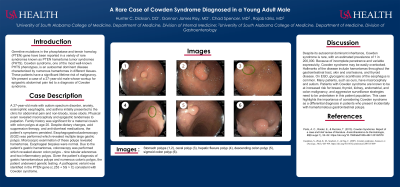Monday Poster Session
Category: Colon
P1699 - A Rare Case of Cowden Syndrome Diagnosed in a Young Adult Male
Monday, October 23, 2023
10:30 AM - 4:15 PM PT
Location: Exhibit Hall

Has Audio

Hunter Dickson, DO
USA Health
Mobile, Alabama
Presenting Author(s)
Hunter Dickson, DO1, Chad Spencer, MD2, Gannon J. Ray, MD2, Rajab Idriss, MD2
1USA Health, Mobile, AL; 2University of South Alabama, Mobile, AL
Introduction: Germline mutations in the phosphatase and tensin homolog (PTEN) gene have been reported in a variety of rare syndromes known as PTEN hamartoma tumor syndromes (PHTS). Cowden syndrome, one of the most well-known PHTS phenotypes, is an autosomal dominant disease characterized by numerous hamartomas in different tissues. These patients have a significant lifetime risk of malignancy. We present a case of a 27-year-old male whose workup for epigastric abdominal pain led to a diagnosis of Cowden syndrome.
Case Description/Methods: A 27-year-old male with autism spectrum disorder, anxiety, eosinophilic esophagitis, and asthma initially presented to the clinic for abdominal pain and non-bloody, loose stools. Physical exam revealed macrocephaly and epigastric tenderness to palpation. Family history was significant for a maternal cousin with colon polyps at age 20. Despite dietary changes, acid suppression therapy, and anti-diarrheal medications, the patient’s symptoms persisted. Esophagogastroduodenoscopy (EGD) was performed which revealed multiple large gastric polyps. Microscopic examination of these polyps revealed hamartomas. Esophageal biopsies were normal. Due to the patient’s gastric hamartomas, colonoscopy was performed which revealed eleven colon polyps - nine tubular adenomas and two inflammatory polyps. Given the patient’s diagnosis of gastric hamartomatous polyps and numerous colonic polyps, the patient underwent genetic testing. A pathogenic variant was identified in the PTEN gene (c.253 + 5G > C) consistent with Cowden syndrome.
Discussion: Despite its autosomal dominant inheritance, Cowden syndrome is rare, with an estimated prevalence of 1 in 200,000. Because of incomplete penetrance and variable expressivity, Cowden syndrome may be easily overlooked. Hallmarks of the disease include hamartomas throughout the gastrointestinal tract, skin and oral lesions, and thyroid disease. On EGD, glycogenic acanthosis of the esophagus is common. Many patients, such as ours, have macrocephaly and autism. Patients with Cowden syndrome are known to be at increased risk for breast, thyroid, kidney, endometrial, and colon malignancy, and aggressive surveillance strategies need to be undertaken in this patient population. This case highlights the importance of considering Cowden syndrome as a differential diagnosis in patients who present incidentally with hamartomatous gastrointestinal polyps.
Disclosures:
Hunter Dickson, DO1, Chad Spencer, MD2, Gannon J. Ray, MD2, Rajab Idriss, MD2. P1699 - A Rare Case of Cowden Syndrome Diagnosed in a Young Adult Male, ACG 2023 Annual Scientific Meeting Abstracts. Vancouver, BC, Canada: American College of Gastroenterology.
1USA Health, Mobile, AL; 2University of South Alabama, Mobile, AL
Introduction: Germline mutations in the phosphatase and tensin homolog (PTEN) gene have been reported in a variety of rare syndromes known as PTEN hamartoma tumor syndromes (PHTS). Cowden syndrome, one of the most well-known PHTS phenotypes, is an autosomal dominant disease characterized by numerous hamartomas in different tissues. These patients have a significant lifetime risk of malignancy. We present a case of a 27-year-old male whose workup for epigastric abdominal pain led to a diagnosis of Cowden syndrome.
Case Description/Methods: A 27-year-old male with autism spectrum disorder, anxiety, eosinophilic esophagitis, and asthma initially presented to the clinic for abdominal pain and non-bloody, loose stools. Physical exam revealed macrocephaly and epigastric tenderness to palpation. Family history was significant for a maternal cousin with colon polyps at age 20. Despite dietary changes, acid suppression therapy, and anti-diarrheal medications, the patient’s symptoms persisted. Esophagogastroduodenoscopy (EGD) was performed which revealed multiple large gastric polyps. Microscopic examination of these polyps revealed hamartomas. Esophageal biopsies were normal. Due to the patient’s gastric hamartomas, colonoscopy was performed which revealed eleven colon polyps - nine tubular adenomas and two inflammatory polyps. Given the patient’s diagnosis of gastric hamartomatous polyps and numerous colonic polyps, the patient underwent genetic testing. A pathogenic variant was identified in the PTEN gene (c.253 + 5G > C) consistent with Cowden syndrome.
Discussion: Despite its autosomal dominant inheritance, Cowden syndrome is rare, with an estimated prevalence of 1 in 200,000. Because of incomplete penetrance and variable expressivity, Cowden syndrome may be easily overlooked. Hallmarks of the disease include hamartomas throughout the gastrointestinal tract, skin and oral lesions, and thyroid disease. On EGD, glycogenic acanthosis of the esophagus is common. Many patients, such as ours, have macrocephaly and autism. Patients with Cowden syndrome are known to be at increased risk for breast, thyroid, kidney, endometrial, and colon malignancy, and aggressive surveillance strategies need to be undertaken in this patient population. This case highlights the importance of considering Cowden syndrome as a differential diagnosis in patients who present incidentally with hamartomatous gastrointestinal polyps.
Disclosures:
Hunter Dickson indicated no relevant financial relationships.
Chad Spencer indicated no relevant financial relationships.
Gannon Ray indicated no relevant financial relationships.
Rajab Idriss indicated no relevant financial relationships.
Hunter Dickson, DO1, Chad Spencer, MD2, Gannon J. Ray, MD2, Rajab Idriss, MD2. P1699 - A Rare Case of Cowden Syndrome Diagnosed in a Young Adult Male, ACG 2023 Annual Scientific Meeting Abstracts. Vancouver, BC, Canada: American College of Gastroenterology.

